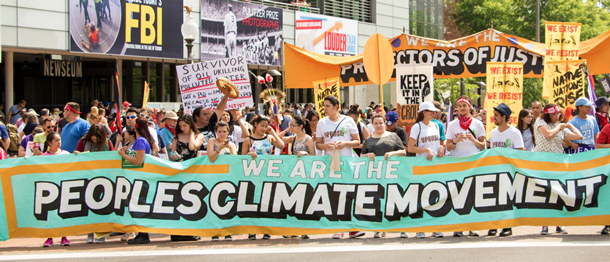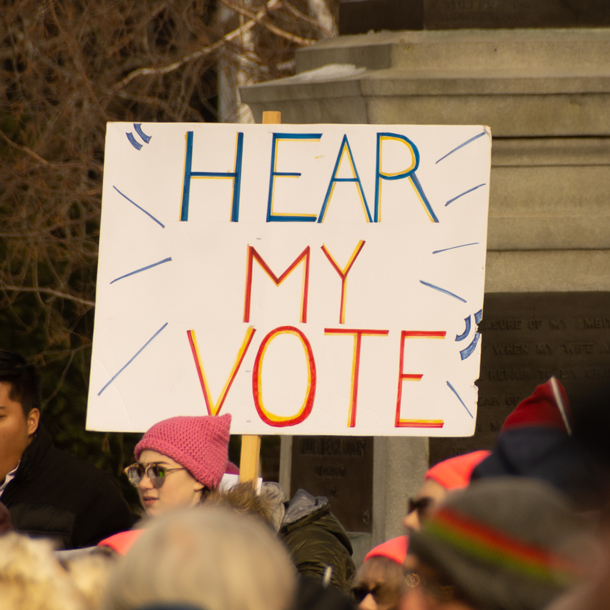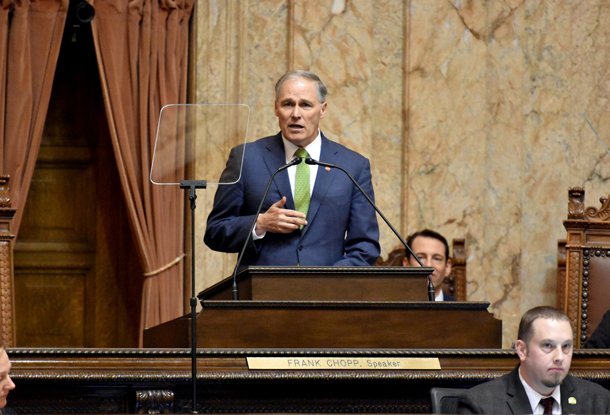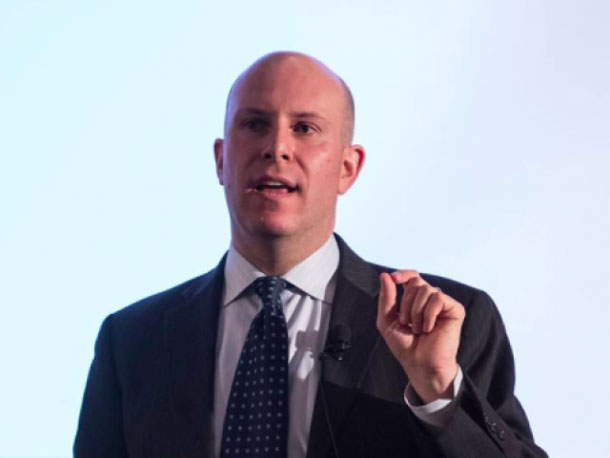No-Show Green Voters
Air Date: Week of August 9, 2019

The Americans who care most strongly about the environment are more likely to be African-American or Hispanic, make less than $50,000 a year, and live in cities. These populations are among those most affected by environmental justice issues – and tend to vote less often than other demographics. (Photo: Becker1999, Flickr, CC BY-NC 2.0)
About 20 million registered voters in the US list the environment as one of their top two priorities. But compared to other voters they’re more likely to stay home on Election Day. These "super-environmentalists" are also more likely to be in a minority group -- they're often African-American or Hispanic -- and they tend to be young and live in cities. Founder of the Environmental Voter Project, Nathaniel Stinnett, joins Host Steve Curwood to discuss what it might mean for environmental policies if these 20 million "super-environmentalists" registered voters actually show up at the polls in greater numbers and what his organization is doing to get out that green vote.
Transcript
[THEME]
CURWOOD: From PRI and the Jennifer and Ted Stanley Studios at the University of Massachusetts Boston, this is an encore edition of Living on Earth. I’m Steve Curwood.
Surveys show the majority of registered voters who say the environment is a top priority for them didn’t bother to cast a ballot in the 2018 US elections. To increase the turnout of environmentally concerned voters and thus influence environmental policies, the non-partisan, non-profit Environmental Voter Project was founded. Nathaniel Stinnett is the Founder and Executive Director of the Environmental Voter Project, and we’ve been following his work. His group tried an experiment to increase turnout among green-focused registered voters in the midterms and he is with us today to discuss the results.
Nathaniel, welcome back to Living on Earth!
STINNETT: Thank you for having me.
CURWOOD: Remind us, please, of your criteria. How do you determine if a voter is what you call an environmental voter?
STINNETT: So we have a very stringent set of criteria. We are only going after people who care so deeply about climate or other environmental issues, that it's their number one priority, over all others, or their number two priority. So these are people we like to call “super-environmentalists”.
CURWOOD: And, demographically, who's most likely to be a “super-environmental” voter?
STINNETT: Well, it's not who you might think. It's not yuppies, in fleeces, jumping out of their Priuses. It is far more likely to be Latinos, African Americans, often people who make less than $50,000 a year, and usually people who live within five or 10 miles of an urban core. With each passing year, this is increasingly a population of poor people, and people who tend to be part of minorities.
CURWOOD: Why do you think so many people of color are in this category of being super-environmentalists?
STINNETT: People of color and poor people are far, far more likely to be on the front lines of climate change, of air quality issues, and water quality issues. So it should come as no surprise to us that the people who care most about these issues are the ones who are being impacted the most by these issues.
CURWOOD: And at the same time, these people don't vote so much.
STINNETT: That's right, they don't. The environmental movement does not have a persuasion problem. There are tons of people who care deeply about environmental issues. We have a turnout problem, we're not showing up on election day. And it's starting to get a little bit better, but it's not getting better fast enough.
CURWOOD: So what do you think it is that holds people back?
STINNETT: We don't know for sure. But let me tell you what we do know, because we know some of the reasons why these people aren't voting. One reason is, as we discussed previously, we know that if you deeply care about the environment, you're more likely to be Latino, African American, poor, and probably young. And those four groups that I just mentioned, they tend to vote less often than the general electorate does. So part of what's going on here is just a basic demographic correlation. But here's the really interesting thing, Steve, if you only look at Latinos, the ones who care about the environment vote less often than the other Latinos. If you only look at young people, the ones who care about the environment vote less often than other young people. So there's something else going on there. And I'm not going to pretend like we know what it is. We've researched it over and over and over again. And it's really hard to figure out. I can tell you some of the excuses that people give. Some people are saying, oh, politicians don't care about the issues that I care about. I think that's probably accurate. But you know how to change that Steve? Vote! Vote! [LAUGHS] So that's part of what we're trying to do here.
I think another thing that's going on is ballot access issues. In any state, where there are laws and regulations that are making it harder for people to register to vote, or harder for people to show up on election day, usually, those laws are making it harder for people of color or young people to vote. And those are the environmentalists. I think it's very important for the environmental movement to internalize this. We're getting better when we talk about environmental justice issues, to realize that environmental issues are often civil rights issues. But it goes the other way as well. Chances are, if there is any civil rights issue at play, it is also disproportionately impacting the environmental movement, because the environmental movement is disproportionately made up of people of color, poor people and young people. And so environmental groups really need to pay attention to ballot access issues. If there is a state that makes it harder for people of color to vote, that means that fewer environmentalists are voting, and that's hurting our ability to impact policymaking.
CURWOOD: Now, your organization focuses on increasing voter turnout, rather than campaigning for any particular candidate or issue. How exactly does that work?

Instead of advocating for particular candidates, the Environmental Voter Project focuses on turning out larger number of environmentally conscious voters at the polls. The EVP believes this is key to making politicians act on the climate crisis. (Photo: Marc Nozell, Flickr, CC BY 2.0)
STINNETT: So, we essentially do two things: we focus on data science and behavioral science. So the first part of it is, we will poll tens of thousands of people to try to identify people who are these super-environmentalists we're talking about, people who care so deeply about climate or the environment, it's one of their top two priorities. Then, we don't talk to the people who are already good voters, they don't need our help, we only focus on the ones who aren't voting. And that's when we shift into the second part of what we do, which is behavioral science. We already know that these people are with us, Steve. So we're not trying to change their opinions about anything. We're just trying to change their behavior, we're trying to turn them into better voters. And the good news at that point is, we can afford to use whatever works, because we don't need to change these people's minds. And so we can take advantage of all of this great research, and just use the messaging that we know has the highest likelihood of getting their rear ends out the door on election day.
CURWOOD: And that is?
STINNETT: We try to take advantage of the fact that we are social animals, not rational animals. So instead of trying to rationally convince someone who cares about a particular issue of the value of their vote, instead, we send them letters telling them how many of their neighbors turned out last time there was an election. Or we used very normative categorical statements like 'real environmentalists vote', or we'll have a canvasser get someone to promise to vote, and then we'll follow up with that voter and we'll say, “Don't you want to be an honest promise-keeper? Follow through on your promise to vote!” We take advantage of these norms that we all buy into, because we've realize that we're not all walking around in a cost-benefit analysis, we're social beings.
CURWOOD: So talk to me about a particular place where you have used these techniques and how people responded.
STINNETT: So a perfect example is we were targeting almost 900,000 unlikely-to-vote environmentalists in Florida. And what we did was, we never tried to rationally convince them of the value of their vote. We never tried to tell them, hey, you care about the environment, or you care about climate change, this is why you've got to vote. We know from all of our previous work that that doesn't work. Instead, we worked with over 2000 volunteers to text and call and canvass these voters. And we sent them direct mail and we sent them digital advertisements. But all of them, all of the messaging, and all of those media, simply focused on these sort of normative, peer-pressure focused messages that I discussed. And you wouldn't think that that would make a big difference. You'd think, gosh, this is like, really juvenile messaging, you're essentially using everything we learned in fourth grade. And you'd be right to think that.
But the results were extraordinary. In Florida alone, we increased turnout 2.2 percentage points among the people we were targeting. And that might not sound like a lot to you. But we were responsible for adding over 17,000 brand-new environmental voters to the electorate in Florida. And what we know, Steve, I know this sounds cynical, but it's just the truth, is that politicians go where the votes are. And so if you get more environmentalists to vote, any politician, whether they're liberal, conservative, or in the middle, they're going to pay attention, because they're in the business of winning elections.

In 2016, the climate crisis was all but ignored in the presidential debates, but several Democratic presidential hopefuls for 2020, including Jay Inslee, have made the climate a priority for their campaigns. (Photo: Jay Inslee, Office of the Governor, Flickr, CC BY-ND 2.0)
CURWOOD: Nathaniel, we're talking at a time that the Democratic field of contenders for the presidency is fairly large. And that means in the early primary, relatively small numbers of votes can make a huge difference. The percentage or two can be huge in the early going.
STINNETT: Well, you're absolutely right, a percentage or two can be the difference maker. And I think we're seeing something really extraordinary go on in American politics right now. Because four years ago, in the Democratic primary, no one was talking about climate change and environmental issues. They weren't. And now, almost everybody is. Signing on to the Green New Deal is almost seen like a litmus test. You have particular candidates, like Jay Inslee, centering their entire presidential campaign around climate change, but you also have other candidates talking about it quite a bit. And this is really extraordinary. A Monmouth poll of likely caucus goers in Iowa, showed that they list climate change as their second most important priority, and environment and pollution as their fifth highest priority. So my advice for people running for president is, talk about this issue. It's what voters increasingly want to hear about.

Nathaniel Stinnett serves as Founder and Executive Director of the Environmental Voter Project. (Photo: Courtesy of the Environmental Voter Project)
But, there's a huge caveat here, Steve. We're not seeing that yet in the general election numbers. When you sweep in Independents, and Republicans and also ten millions of new voters of all persuasions who are going to vote in the general election, climate and environmental issues are at best sixth, seventh, eighth, on people's lists of priorities. And I think this is why you're seeing Democrats who are running for president on the stump in New Hampshire promote the Green New Deal. And then when they're back in DC in the well of the Senate, they don't sign on to it. And it's because they're trying to appeal to two different electorates at once. And I think this illustrates perfectly the importance of voting. Politicians go where the votes are. And they're starting to wake up to the realization that there are lots of climate voters in the Democratic primary. But they're also cognizant of the fact that there aren't yet enough climate votes in the general, and we need to change that.
CURWOOD: Nathaniel Stinnett is founder and executive director of the Environmental Voter Project. Thanks so much for taking the time, Nathaniel.
STINNETT: It was my pleasure. Thanks for having me, Steve.
Links
The Environmental Voter Project Website
The Guardian | “’We Need Some Fire’: Climate Change Activists Issue Call to Arms for Voters”
Living on Earth wants to hear from you!
Living on Earth
62 Calef Highway, Suite 212
Lee, NH 03861
Telephone: 617-287-4121
E-mail: comments@loe.org
Newsletter [Click here]
Donate to Living on Earth!
Living on Earth is an independent media program and relies entirely on contributions from listeners and institutions supporting public service. Please donate now to preserve an independent environmental voice.
NewsletterLiving on Earth offers a weekly delivery of the show's rundown to your mailbox. Sign up for our newsletter today!
 Sailors For The Sea: Be the change you want to sea.
Sailors For The Sea: Be the change you want to sea.
 The Grantham Foundation for the Protection of the Environment: Committed to protecting and improving the health of the global environment.
The Grantham Foundation for the Protection of the Environment: Committed to protecting and improving the health of the global environment.
 Contribute to Living on Earth and receive, as our gift to you, an archival print of one of Mark Seth Lender's extraordinary wildlife photographs. Follow the link to see Mark's current collection of photographs.
Contribute to Living on Earth and receive, as our gift to you, an archival print of one of Mark Seth Lender's extraordinary wildlife photographs. Follow the link to see Mark's current collection of photographs.
 Buy a signed copy of Mark Seth Lender's book Smeagull the Seagull & support Living on Earth
Buy a signed copy of Mark Seth Lender's book Smeagull the Seagull & support Living on Earth

